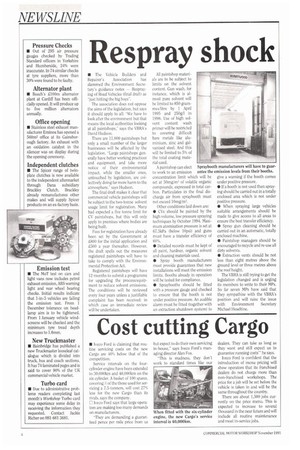Respray shock
Page 100

If you've noticed an error in this article please click here to report it so we can fix it.
• The Vehicle Builders and
Repairer's Association has slammed the Environment Secretary's guidance notes — Respraying of Road Vehicles (final draft) as -just hitting the big boys".
The association does not oppose the aims of the legislation, but says it should apply to all: "We have to look after the environment but that means the local authorities looking at all paintshops," says the VBRA's David Hudson.
There are 11.000 paintshops but only a small number of the larger businesses will be affected by the legislation. -Large paintshops generally have better working practices and equipment, and take more notice of their environmental impact, while the smaller ones, untouched by legislation, are collectively doing far more harm to the atmosphere." says Hudson.
The final draft makes it clear that commercial vehicle paintshops will be subject to the two-tonne solvent usage limit for registration. Many had expected a five tonne limit for CV paintshops, but this will only apply to premises where bodies are being built.
Fees for registration have already been set by the Government at £800 for the initial application and $.500 a year thereafter. However. the draft spells out the measures registered paintshops will have to take to comply with the Environmental Protection Act.
Registered paintshops will have 12 months to submit a programme for upgrading the process/equipment to reduce solvent emissions. The conditions will be reviewed every four years unless a justifiable complaint has been received; in which case an immediate review will be undertaken. All paintshop materials are to be subject to limits on the solvent content. Gun wash, for instance, which is almost pure solvent will be limited to 850 grammes/litre by 1 April 1995 and 2500 in 1998. Use of high solvent content wash primer will be restricted to covering difficult bare metals like aluminium, zinc and galvanised steel. And this will be limited to 5% of the total coating material used.
A paintshop can elect Sprayboo to work to an emission antee the concentration limit which will be set at 50mg/m3 of volatile organic compounds, expressed in total carbon. Particulates in the final discharge air from spraybooth must not exceed 10mg/m3.
Other conditions laid down are: • CVs should be painted by the high volume, low pressure spraying techniques by October 1994. Maximum atomisation pressure is set at 67.5kPa (below 10psi) and guns must have a transfer efficiency of 60%.
• Detailed records must be kept of all paint, hardner. organic solvent and cleaning materials used.
• Spray booth manufacturers must provide guarantees that new installations will meet the emission limits. Booths already in operation will be tested for compliance.
• Spraybooths should be fitted with a pressure gauge and checked to ensure that the booth is not under positive pressure. An audible alarm must be Fitted (together with an extraction shutdown system) to th manufacturers will have to guaremission levels from their booths. give a warning if the booth comes under positive pressure.
• If a booth is not used then spraying should be carried out in a totally enclosed area which is not under positive pressure.
• When spraying large vehicles suitable arrangements should be made to give access to all areas to ensure the best transfer efficiency.
• Spray gun cleaning should be carried out in an automatic, totally enclosed machine.
• Paintshop managers should be encouraged to recycle and re-use all dirty solvents.
• Extraction vents should be not less than eight metres above the ground level or three metres above the roof height.
The I'BRA is still trying to get the legislation changed and is urging its members to write to their MPs. So far seven MPs have said that they sympathise with the VBRA's position and will raise the issue with Environment Secretary Michael Heseltine.




























































































































